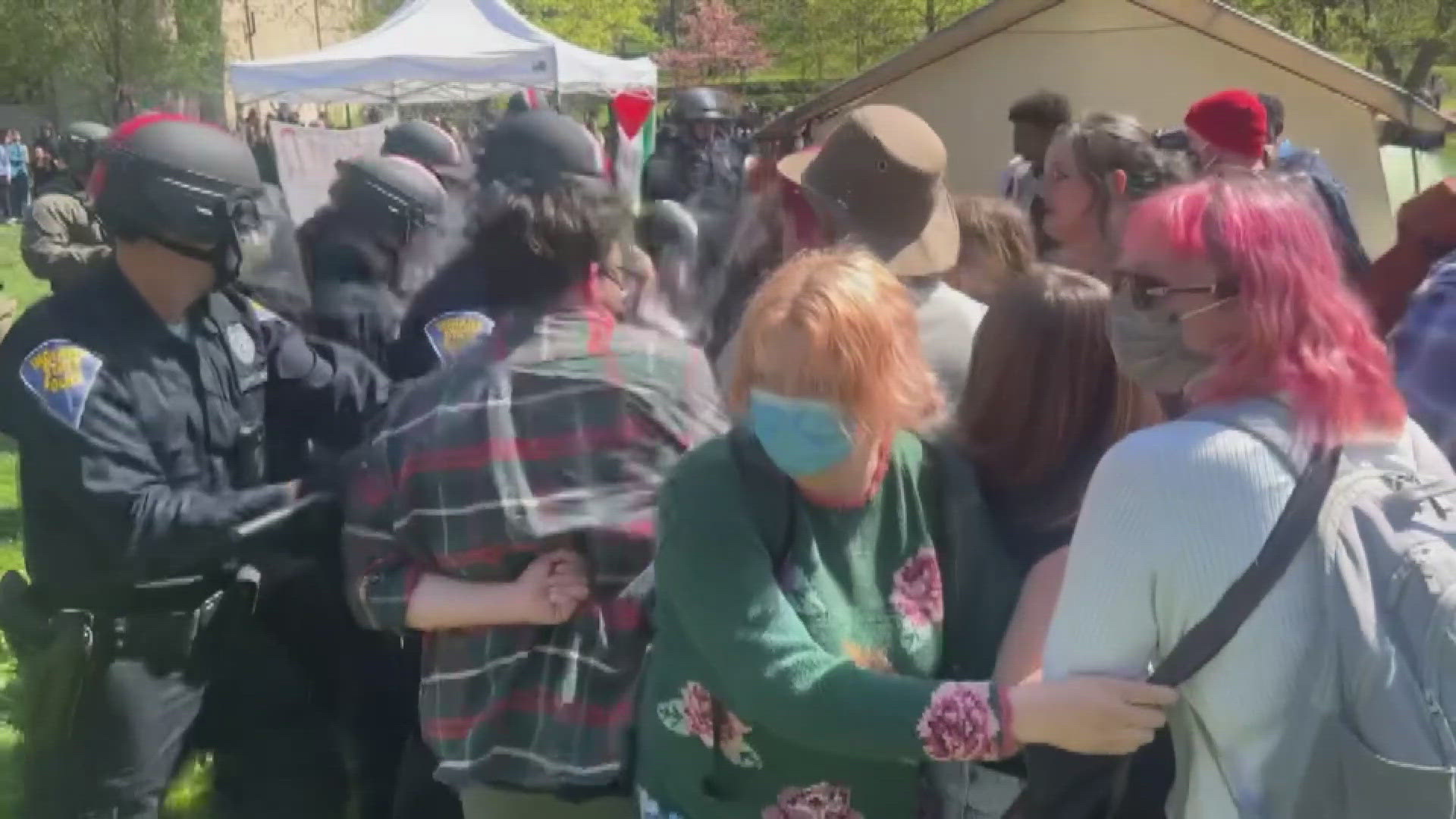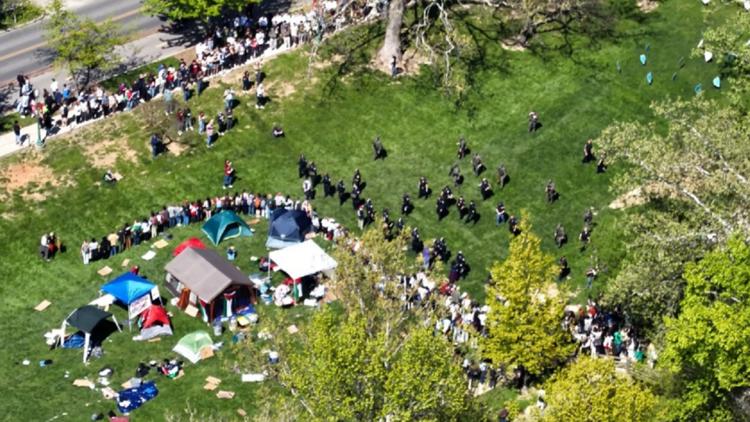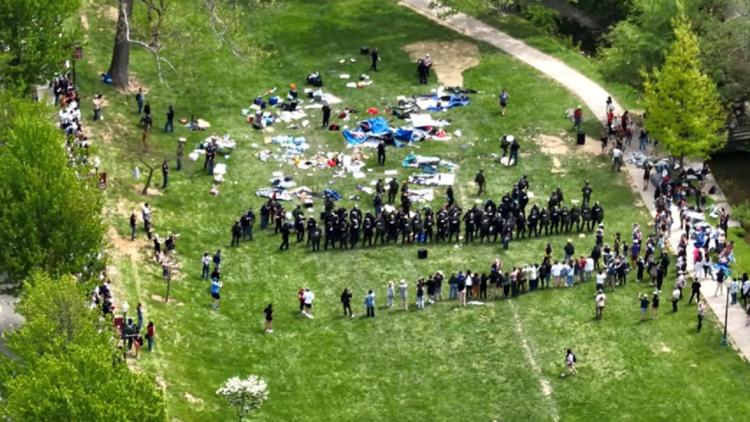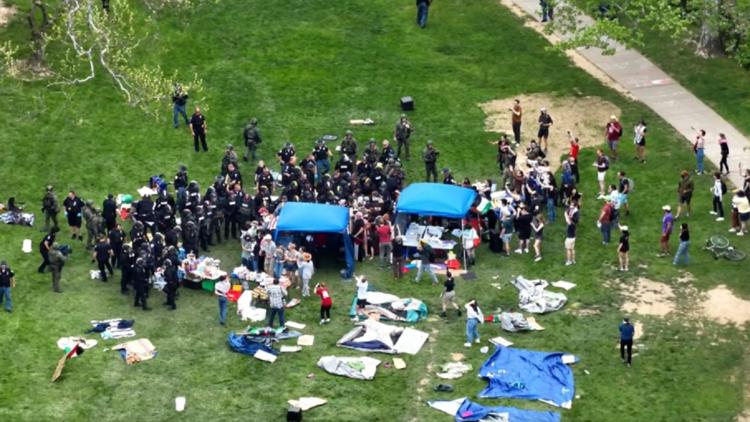BLOOMINGTON, Ind. — The Indiana University Board of Trustees affirmed IU's existing First Amendment Policy and ratified a "Expressive Activity Policy" after criticism of the handling of protests in April that led to dozens of arrests.
The change comes after and independent law firm found, IU administrators may have caused confusion and accelerated tensions with protesters by enacting a last-minute policy change the night before April’s Gaza war protest arrests in Bloomington.
Indiana State Police arrested 55 protesters who set up an encampment in Dunn Meadow.
The Expressive Activity Policy "supports protests and demonstrations that don’t materially or substantially disrupt university operations or hinder the expressive activity of another individual or group," according to a university release.
It goes into effect on Aug. 1.
Here are some of the activities outlined:
Permitted
- Assembling in public areas of campus, including IU Bloomington’s Dunn Meadow.
- Peaceful protesting.
- Making speeches.
- Carrying signs.
- Expressing views through writing, publishing or distributing literature.
- Writing with water soluble chalk on sidewalks.
- Conducting expressive activities between 6 a.m. and 11 p.m.
- Public celebrations of significant IU achievements.
Not permitted
- The use of temporary structures without approval at least 10 days in advance. Unapproved temporary structures are subject to immediate removal.
- Outdoor amplified sound that materially or substantially disrupts the academic, living or working environment of the university and its neighbors.
- Placing signs into the ground, affixing them to or hanging them from university property without prior permission. Unapproved signs are subject to immediate removal.
- Applying permanent or semi-permanent markings, including spray chalk, on any university property.
- Camping at any time unless approved in conjunction with an approved university event.
The board's decision is in response to the independent study that released a 77-page report after a six-week investigation. It was conducted by the international law firm, Cooley.
In addition to interviews with IU students, faculty and university police, the firm looked through more than 10,000 internal documents and emails, more than 100 hours of video footage and relevant university policies.
NOTE: The above video is from a previous report on the independent study results.
The firm also interviewed members of the Indiana University Police Department, Indiana State Police and the Monroe County prosecutor.
The report concludes that IU administrators acted in good faith with concerns over safety risks from an encampment, but the sudden and unannounced policy change was not effectively implemented.
“IU leadership’s decision to change the Dunn Meadow policy was permissible under university policies and applicable legal standards, including the First Amendment; however, doing so the night before the planned encampment caused a number of unintended negative consequences,” the law firm wrote in the report.
PHOTOS: Protests at Dunn Meadow on IU's campus
The report also concluded that IU has had a decades-long history of “inconsistently” enforcing its policies, which leads to confusion for students, faculty and campus police.
The IU Police Department is understaffed, the report shows, and the firm included more funding to university police in their list of recommendations:
- Recommendation 1: IU should approve a new expressive activity policy.
- Recommendation 2: To establish clearer and more consistent policies, the IU president should direct a review for gaps or inconsistencies between university-wide and campus-specific policies and make recommendations to the Board of Trustees on necessary changes.
- Recommendation 3: IU should implement adequate training and communication about its policies and appropriate audit procedures to ensure the consistent application of policies.
- Recommendation 4: IU should establish a plan for implementing any new policy related to expressive activity.
- Recommendation 4.1: IU should clearly communicate this plan to relevant stakeholders and set expectations regarding the Indiana State Police’s involvement.
- Recommendation 4.2: IU should impose predictable and consistent conduct consequences for violating any new policy.
- Recommendation 5: IU should increase funding to the IU Police Department in order to hire and retain more officers and bolster existing training and technological capacity.
- Recommendation 6: IU should consider utilizing campus-wide communications to alert the IU community of encampments or other large-scale or disruptive protests.
- Recommendation 7: IU should consider adopting a policy of not issuing official statements about public matters that do not directly affect the university’s core functions.
Recommendation 8: IU should improve communications involving critical constituencies on campus.
“The Dunn Meadow report validated the need to update policies that were outdated, unclear and inconsistent across IU’s campuses,” Trustees Chair W. Quinn Buckner said. “Indiana University has a longstanding commitment to advancing free speech. In order for free speech for all to flourish, we needed to clarify our policies so people clearly understand the allowable time, manner and place for free expression. We can’t let one person or group’s expression infringe on the rights of others, disrupt learning experiences for our students or interrupt regular university business.”
The final IU policy, along with additional free speech resources, is available on IU’s Free Speech website.









